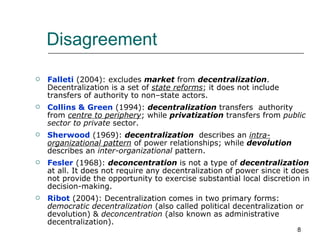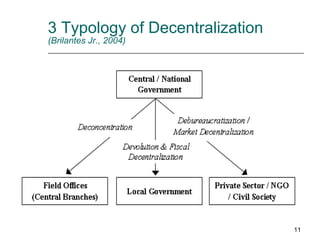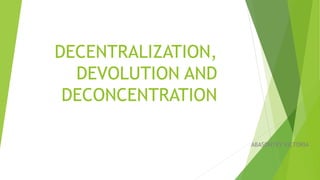Deconcentration of power refers to the distribution and decentralization of power within a political or social system. This can take many forms, including the devolution of power from the national government to subnational entities such as states or provinces, the decentralization of power within an organization, or the distribution of power among different branches or levels of government. The goal of deconcentration is to increase democracy, accountability, and representation by giving more people a say in the decisions that affect their lives.
There are many benefits to deconcentration of power. One of the main advantages is that it can help to reduce corruption and abuse of power. When power is concentrated in the hands of a few individuals or groups, it is easier for them to abuse their authority and engage in corrupt practices. By spreading power out among different levels or branches of government, or by giving more authority to local governments and communities, it becomes more difficult for any one group or individual to wield too much influence.
Another benefit of deconcentration is that it can lead to more effective and responsive governance. When power is decentralized, decisions are made closer to the people they affect, which means that they are more likely to be tailored to the needs and priorities of those communities. This can result in policies and services that are more relevant and effective, as they are based on a more accurate understanding of local conditions and needs.
Deconcentration of power can also help to promote greater participation and engagement in the political process. When people feel that they have a say in the decisions that affect their lives, they are more likely to get involved and make their voices heard. This can lead to a more vibrant and active democracy, as people feel more invested in the political system and are more likely to hold their elected representatives accountable.
There are, however, some challenges and risks associated with deconcentration of power. One concern is that it can lead to a fragmented and inconsistent approach to policy and decision-making, as different levels of government or different branches of government may have different priorities and agendas. There is also the risk that decentralization may lead to a lack of coordination and cooperation, which can hinder the ability of the system to function effectively.
Overall, the deconcentration of power can be a useful tool for promoting democracy, accountability, and effective governance. It is important, however, to carefully consider the potential risks and challenges and to ensure that any decentralization efforts are well-managed and carefully planned. By doing so, it is possible to achieve the benefits of deconcentration while minimizing any negative impacts.
The 4th Industrial Revolution and Future of ‘Deconcentration’ of Power

These companies literally know our personal lives more than we do, they employ high technologies to collect information about user behaviour and intimate life in real time- this is the information that no central government may have. Taking the example of the state, deconcentration is the transfer of competences from central government entities or departments—those that have a jurisdiction over the entire national territory—to peripheral government entities, which have jurisdiction only over a part of the national territory. One of the famous DLT is Blockchain that is highly demployed amongst cryptocurrency and peer to peer currency platforms like Bitcoin among others. These companies are very rich to the extent that penalties for non compliance with statutory obligations in regard to data protection do not cause a pitch of pain! The new liberals are the heirs of the classical liberals. FROM: Capitalism and Freedom - Milton Friedman Now we know that instead of coming to a consensual meaning for what to be a new liberal means, we have at least three different ideological camps that claim the name, the classical liberals, the new liberals, and the liberals. The Politics of Decentralisation. Central and Local Government Relations: A Comparative Analysis of Western European Unitary States.
Deconcentration of power means the_______

On the other hand, large units may affect the relation between citizens and administrators and therefore the responsiveness of the regional government. An email system under web1 only facilitated communication between two people in real time. This can be likened to the mediaeval eras characterised by primitive accumulation and concentration of power by a few Lords who became rulers only to exploit, oppress and subject the rest into servitude. Local government is often, but not necessarily, related to the former; local self-government to the latter. Deconcentration broadly means that, for the sake of convenience, some functions have been devolved from a central…. For the past twenty years, the world has been grappling with data protection and privacy concerns, today almost three-quarters of the world at least have legal frameworks that facilitate the legitimate exploitation of personal data. Administrative deconcentration is the transfer of competences, or administrative powers, within the same institution; administrative decentralization is the transfer of competences between institutions with political and administrative autonomy.
deconcentration

Part of their competences will be transferred to the newly created form of regional government and part of the remaining competences can be deconcentrated to its regional offices. Coimbra, Portugal: Almedina, 2007. Consequently, this meant more innovations around data storage services. This disrupted the hustle and bustle of delivering mails through intermediaries and risking them getting misplaced with all the well written love messages. In the three decades after the end of World War II 1939—1945 , administrative deconcentration prevailed in most industrialized countries as the preferred mechanism for the vertical organization of the state. Storage devices and offshore data storage facilities have since technically grown by leaps and bounds making data collection and storage services accessible and cheaper than ever before. The beauty of platforms enabled by DLT is that they reverse 'data power' concentration from singularly owned centralised databases by decentralising data to the owners, this means, a user has autonomy and control of how and to whom he or she is sharing his or her personal data with, and this is akin to the concept of decentralisation of power in the modern democracies.
Decentralization and deconcentration

The internet only enabled sharing of information with no characteristic of interaction. Decentralization tends to increase institutional capacity and local empowerment, making local governments and local communities more competent to deal with their own affairs. The classical liberals are the proponents of 19th-century laissez-faire. Decentralization can also produce inequity in the amount and quality of public services delivered, according to the area of residence, in comparison with a situation in which the same services are delivered by central government based on common standards independent from the geographical location. The data protection and privacy legal regimes stem from the challenges posed by data collection, storage, sharing and internet user commodification enabled by sophisticated technologies. In the 90s, the internet started taking shape through web1 systems that only enabled the sharing of information from one consumer to another, giving birth to the famous Yahoo email and changing an outlook of how people with access to the internet communicated.
Centralization, Deconcentration, And Decentralization Essay ⋆ Political Science Essay Examples ⋆ EssayEmpire

Decentralization increases the opportunities for citizens to participate in local or regional public affairs, offering new conditions for participation and for public-private partnership, therefore reinforcing the involvement of local civil society in the management of its own affairs. In the 90s, the internet started taking shape through web1 systems that only enabled the sharing of information from one consumer to another, giving birth to the famous Yahoo email and changing an outlook of how people with access to the internet communicated. Oxford: Clarendon Press, 1990. Found in Early in the 1960s, many developed countries were still living under some interventionist policies introduced to regiment private enterprise for the effort of winning WWII, such as exchange controls, confiscatory income tax rates, wage and VIEWED AS a means to the end of political freedom, economic arrangements are essential because of the effect which they have on the concentration or the deconcentration of power. Notably, the advancement and evolution of the internet infrastructure has reshaped how data is collected, shared, stored, used and redefined business models.

Finally, decentralization may also allow local communities to counterweight decisions taken by the central government on issues likely to affect their local or regional well-being. A major thesis of the new liberal is that the kind of economic organization that provides economic freedom directly, namely, organization of economic activities through a largely free market and private enterprise, in short through competitive capitalism, is also a necessary though not a sufficient condition for political freedom. The authors are co-founders of Enset Tech Policy and Regulation Advisory hello ensetlaw. In the early 2000s, we transitioned to web2 which is a 'landlord' to most of the highly interactive social media, e-commerce and fintech platforms enabled by cutting-edge technologies like Artificial Intelligence and machine learning that consumers literally rely on for anything in their day-to-day life. The progress of the reforms was underlined by the establishment of the National Committee for Sub-National Democratic Development NCDD in 2008.





